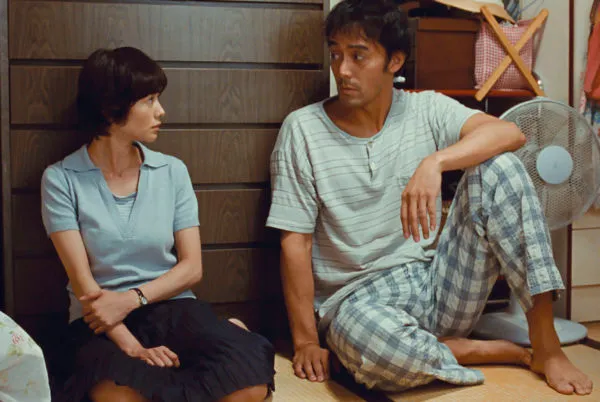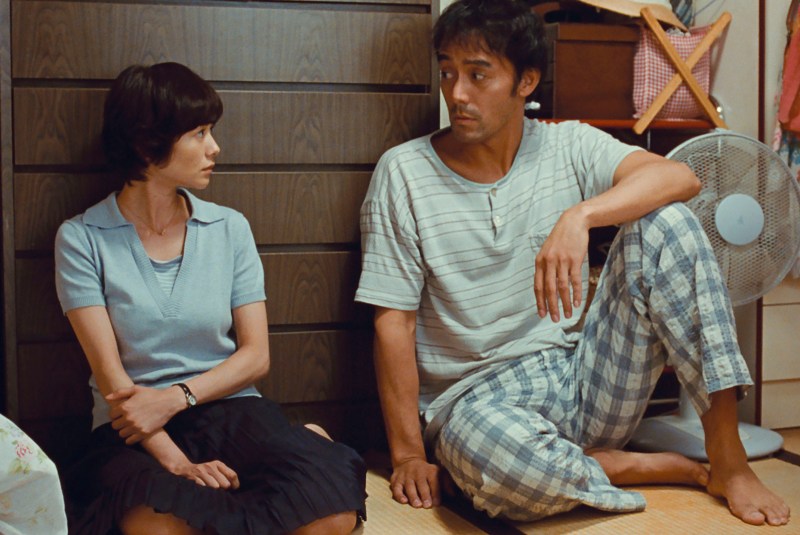
As I watched Hirokazu Koreeda’s new film “After the Storm,” I was reminded of Roger Ebert’s review of the 1999 film “Goodbye, Lover.” Ebert comments that the plot of that film “is so labyrinthine that I’d completely forgotten the serial killer named ‘The Doctor,’ who murders young women by injecting curare into their veins with a syringe. When a character like The Doctor is an insignificant supporting character, a movie’s plate is a little too full, don’t you think?”
The same could be said of Koreeda’s work. There is no equivalent of The Doctor in the film, but Koreeda discusses gambling addiction, voyeurism, divorce, strained father-son relationships, washed-up artists, old age and death in a mere two hours. All of these topics are engaging and dramatic, and great films have been made about each of them. “After the Storm,” however, tries to tackle all of them, and the movie’s plate gets so full that I wanted to stop eating. Koreeda is a skilled director. His 2008 film “Still Walking” is a superb examination of the lingering effects of grief. And to his credit, in moments in “After the Storm,” he is able to craft simple, poignant commentaries on the nature of family and love. Still, these moments are often overshadowed by the complexity of the plot. Because there is a surfeit of story, Koreeda has to make superficial statements instead of nuanced ones in the interest of time, and his overwhelmed actors deliver weak performances. Ultimately, “After the Storm” is a subpar work from a talented director.
The protagonist of “After the Storm” is Ryota Shinoda, a man undergoing a midlife crisis. He is a writer, but his only book, “The Empty Table,” was published years ago. Now, he works as a private detective, telling his friends that he is doing research for another novel. Despite these claims, Ryota has stopped writing, and he wastes all of his income gambling in the lottery or at the racetrack. In a word, Ryota is washed-up.
Although Ryota is divorced, he is still obsessed with his ex-wife, Kyoko. When he has little work to do, he follows her around, watching her interact with her new boyfriend. He also keeps tabs on his 11-year-old son, Shingo. Ryota is not supposed to see his son because he has not paid his child support. Still, through some legal loophole, he is allowed to take him to visit his elderly mother, who is distraught over the loss of her husband and despondent due to her old age. When Ryota, his mother, Kyoko and Shingo are all trapped together during a typhoon, they are forced to renegotiate their relationships and deal with their demons.
Still, these characters have so many demons that they would be unable to deal with them even if the typhoon was the flood from Genesis. Not only is it hard to keep track of all the characters’ foibles, but because they are facing innumerable dilemmas, they seem doomed from the start. As the characters struggle to surmount the obstacles they must confront, their problems seem to cancel each other out. Even if Ryota overcomes his gambling addiction, he still has to repair his relationships with his wife and son, take care of his aging mother, begin writing again and solve the complicated case at the detective agency. Therefore, his gambling addiction becomes negligible.
Even Koreeda’s actors do not know how to navigate the characters’ dilemmas. In their roles as Ryota and Kyoko, Hiroshi Abe and Yōko Maki are likable but seem disaffected in even the most emotional moments. Although a problem like Ryota’s voyeurism should be genuinely disturbing, Abe does not really explore the implications of this quandary. When he sees his wife embrace her new boyfriend passionately, he is not enraged or titillated. His face remains blank throughout these sequences. Then, when Ryota confesses to Kyoko that he has been spying on her for months, she replies, “You’re Mr. Detective. Of course. How can you stoop so low?” Maki’s delivery of this line is so nonchalant that she transforms Ryota’s transgression into a pedestrian occurrence. Still, not even the most skilled actors could bring these characters to life, because Koreeda is responsible for the bizarreness of this moment. He never addresses voyeurism again in the film because he has so many other plot lines to resolve. Abe and Maki are supposed to play ordinary people, but Koreeda’s rushed handling of a major problem like Ryota’s spying contorts his actors into extraordinary positions.
“After the Storm” is particularly frustrating because, in its strongest moments, it demonstrates that Koreeda can create nuanced examinations of difficult issues. At these points, Koreeda forgets about the larger story and simply focuses on how the characters interact with one another. His characters speak and act plainly, and yet, the simplicity of the words and actions illuminates their innate humanity and reveals complex, universal truths. For example, when Ryota and his sister reminisce about their wastrel father, they agree that he affected their lives positively, yet they cannot find a single good thing to say about him. Thus, Koreeda reminds us that even the most flawed individuals can have an enormous impact on our lives.
The storm referenced in the film’s title is supposed to be the typhoon that brings the family together. After the storm, the characters are supposed to try and piece their lives back together. Still, there is another storm brewing in the film – the unseemly storm of Koreeda’s underdeveloped and overcomplicated story. After this storm, there are no moments of clarity, just needless confusion that clouds Koreeda’s craft. It is a shame that neither the viewer nor Koreeda himself can navigate the currents of this tempest.
Contact Amir Abou-Jaoude at amir2 ‘at’ stanford.edu.
